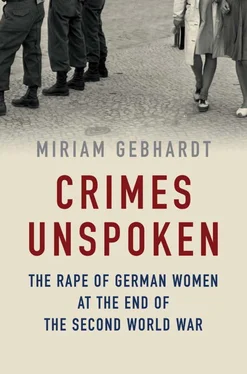Segmüller, Über reactive Selbstmorde und Selbstmordversuche .
Ibid., p. 37.
Svenja Eichhorn et al., ‘Bewältigungsstrategien und wahrgenommene soziale Unterstützung bei deutschen Langzeitüberlebenden der Verwaltigungen am Ende des II. Weltkriegs’, in: Psychiatrische Praxis 39 (2012), pp. 169–73, here p. 169; see also Eichhorn and Kuwert, Das Geheimnis der Grossmütter.
Eichhorn and Kuwert, Das Geheimnis der Grossmütter , p. 94.
See Miriam Gebhardt, Die Angst vor dem kindlichen Tyrannen: Eine Geschichte der Erziehung im 20. Jahrhundert (Munich 2009).
Vera Neumann, ‘Kampf um Anerkennung: Die westdeutsche Kriegsfolgengesellschaft im Spiegel der Versorgungsämter’, in: Naumann, Nachkrieg in Deutschland , pp. 364–83.
‘GItrace’ ( www.gitrace.org), the platform ‘Children born of the war’ ( www.bowin.eu) and the Boltzmann Institute ( www.bim.lbg.ac.at). In Russia there is a television programme entitled Zhdimenya (‘Wait for me’) for those seeking relatives.
Köpp, Warum war ich bloss ein Mädchen? p. 9.
See Svenja Goltermann, Die Gesellschaft der Überlebenden: Deutsche Kriegsheimkehrer und ihre Gewalterfahrungen im Zweiten Weltkrieg (Munich 2009).
The popularity of the concept of trauma and its inflationary position today, also in the humanities and in popular discourse, began in the 1970s. For the critical relationship between the concept of clinical trauma and its appropriation by the humanities, see Harald Weilnböck, ‘“Das Trauma muss dem Gedächtnis unverfügbar bleiben”: Trauma-Ontologie und anderer Miss-/Brauch von Traumakonzepten in geisteswissenschaftlichen Diskursen’, in: Mittelweg 36, Zeitschrift des Hamburger Instituts für Sozialforschung (April 2007), pp. 2–64.
Staatsarchiv Freiburg, compensation court, individual cases, 3889; name abbreviated to protect the patient.
Ibid.
Svenja Goltermann, ‘Im Wahn der Gewalt: Massentod, Opferdiskurs und Psychiatrie 1945–1956’, in: Naumann, Nachkrieg in Deutschland , pp. 343–63, here pp. 358–9.
Some formulations recur in current research literature, particularly the thesis by Kuby of the women’s ‘surprisingly rapid’ convalescence; see Naimark, Die Russen in Deutschland , pp. 162–3; Sibylle Meyer and Eva Schulze, ‘Als wir wieder zusammen waren, ging der Krieg im Kleinen weiter’, in: Niethammer and Plato (eds.), Wir kriegen jetzt andere Zeiten , pp. 305–26.
Regina Mühlhäuser, ‘Massenvergewaltigungen in Berlin 1945 im Gedächtnis betroffener Frauen: Zur Verwobenheit von nationalistischen, rassistischen und geschlechtsspezifischen Diskursen’, in: Veronika Aegerter et al. (eds.), Geschlecht hat Methode: Ansätze und Perspektiven in der Frauen- und Geschlechtergeschichte (contribution to the Ninth Swiss Historians’ Conference 1988) (Zurich 1999), pp. 235–46, here p. 239; see also Mühlhäuser, Vergewaltigungen in Deutschland 1945 , p. 389; Atina Grossmann, ‘Eine Frage des Schweigens: Die Vergewaltigung deutscher Frauen durch Besatzungssoldaten – Zum historischen Hintergrund von Helke Sanders Film BeFreier und Befreite’, in: Frauen und Film 54/55 (1994), pp. 14–28, here pp. 19, 21; Grossmann, ‘A Question of Silence’; Hsu-Ming Teo, ‘The Continuum of Sexual Violence in Occupied Germany, 1945–1949’, in: Women’s History Review 5, 2 (1996), pp. 191–218, here p. 193; Sibylle Meyer and Eva Schulze, Wie wir das alles geschafft haben: Alleinstehende Frauen berichten über ihr Leben nach 1945 (Munich 1993), p. 64; also sceptical of the resilience thesis: Naimark, Die Russen in Deutschland , pp. 162–3.
Pauline Nyiramasuhuko, the former Minister for Family Affairs, who organized massacres and encouraged sexual assaults on Tutsi women. There were also women soldiers in the Red Army who were at least approving bystanders. In civilian life, women are also instigators, accomplices and perpetrators of sexual violence against women and men. In a group rape in Munich in 2014, two teenage girls lulled their two female victims into a false sense of security before abusing them sexually and then handing them over to male rapists.
Erich Kuby, ‘Die Russen in Berlin’, in: Der Spiegel 19/1965–24/1965; Kuby, Die Russen in Berlin.
Kuby, Die Russen in Berlin , p. 213.
Ibid., pp. 314–15.
Ibid., p. 308.
Richard Bessel, ‘Was bleibt vom Krieg? Deutsche Nachkriegsgeschichte(n) aus geschlechtergeschichtlicher Perspektive: Eine Einführung’, in: Militärgeschichtliche Zeitschrift 60 (2001), pp. 297–305, here p. 298.
Naimark, Die Russen in Deutschland , p. 300.
Robert G. Moeller, ‘Heimkehr ins Vaterland: Die Remaskulinisierung Westdeutschlands in den fünfziger Jahren’, in: Militärgeschichtliche Zeitschrift 60 (2001), pp. 403–36.
Heimatmuseum Charlottenburg, exhibition ‘Worüber kaum gesprochen wurde: Frauen und allierte Soldaten’, 3–15 October 1995.
Meyer and Schulze, ‘Als wir wieder zusammen waren’, p. 313.
Ibid., p. 314.
Ibid., p. 316.
Sibylle Meyer and Eva Schulze, Von Liebe sprach damals keiner: Familienalltag in der Nachkriegszeit (Munich 1985), p. 134.
Heineman, The Hour of the Woman , p. 370.
Mühlhäuser, ‘Vergewaltigungen in Deutschland’, pp. 390–1.
Maria Höhn, ‘Frau im Haus and Girl im Spiegel: Discourse on Women in the Interregnum Period of 1945–1949 and the Question of German Identity’, in: Central European History 26, 1 (1993), pp. 57–90, here p. 89; see also Annette Kuhn, ‘Power and Powerlessness: Women after 1945, or Continuity of the Ideology of Femininity’, in: German History 7, 1 (1989), pp. 35–46.
See also Leonie Treber, Mythos Trümmerfrauen: Von der Trümmerbeseitigung in der Kriegs- und Nachkriegszeit und der Entstehung eines deutschen Erinnerungsortes (Essen 2014).
Mühlhäuser, ‘Massenvergewaltigungen in Berlin’, p. 239.
Quoted in ibid., p. 389.
Quoted in Hildebrandt and Kubella (eds.), Mein Kriegsende , p. 32.
Frank Biess, ‘Pioneers of a New Germany: Returning POWs from the Soviet Union and the Making of East German Citizens 1945–1950’, in: Central European History 32 (2000), p. 166.
See speeches and publications on the tenth anniversary of the International Criminal Court on the medica mondiale website, www.medicamondiale.org.
Читать дальше











